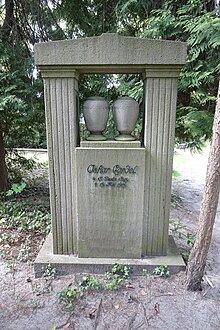Oskar Cordel

Oskar Cordel (born December 18, 1843 in Aschersleben , † May 13, 1913 in Berlin-Nikolassee ) was a German chess player and author. However, he did not take part in major tournaments.
In addition to his chess activities, he also appeared as a chess author. In the Spanish game , the Cordel defense and the Cordel gambit are named after him. In the work Theory and Practice of the Chess Game , published after his death , he took the view that in almost every chess position there is either a clearly best move or at least three roughly equally good (best) moves (the so-called three-move law). In 1878 Cordel was a co-founder of the East German Chess Federation.
Cordel was editor and employee of the Vossische Zeitung .
One of his hobbies was growing roses. A Remontant breed was named after Cordel by Peter Lambert in 1897 .
Oskar Cordel died in Nikolassee near Berlin in 1913. He found his final resting place in the Evangelical Churchyard Nikolassee . The representative grave monument that has been preserved consists of a pillar aedicula in which two decorative urns stand on a high base.
Books
- 1888: Guide through chess theory (Berlin)
- 1907: The chess game (Potsdam)
- 1913: Theory and Practice of Chess (Potsdam)
Web links
- Replayable chess games by Oskar Cordel on chessgames.com (English)
Individual evidence
- ↑ Ingo Althöfer: Thoughts on the 3-move law by Oskar Cordel. Preprint, Jena 2009 ( online )
- ↑ Cordel on welt-der-rosen.de
- ↑ Rose 'Oscar Cordel'
- ^ Hans-Jürgen Mende: Lexicon of Berlin burial places . Pharus-Plan, Berlin 2018, ISBN 978-3-86514-206-1 , p. 624.
| personal data | |
|---|---|
| SURNAME | Cordel, Oskar |
| ALTERNATIVE NAMES | Cordel, Oskar Thiederich |
| BRIEF DESCRIPTION | German chess player and author |
| DATE OF BIRTH | December 18, 1843 |
| PLACE OF BIRTH | Aschersleben |
| DATE OF DEATH | May 13, 1913 |
| Place of death | Berlin-Nikolassee |